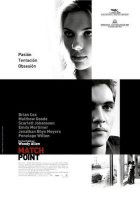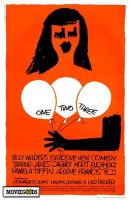
Match Point (Woody Allen, 2005)
Rating: 7.7
Four Meanings of a film Assignment:
1. Fabula: Former Tennis Pro, Chris Wilton (Jonathan Rhys Meyers) befriends Tom Hewett (Matthew Goode) and immediately is embraced by the well-off British upper-class Hewett family. Tom’s sister Chloe (Emily Mortimer) falls in love with Chris and they eventually marry. Temptation interferes, as Chris has always been infatuated with Tom’s ex-fiancée Nola (Scarlett Johansson) and he begins playing a dangerous, game trying to juggle relationships with two women at once.
2. Explicit Meaning: Being lucky in life can ultimately hold more importance than hard work and talent, and can possibly cancel out morals. Throughout the film we are reminded of how an instance of luck can be the difference between success and failure. Anecdotes in the beginning with the ball paused in mid-air and the voice-over narration as well as Chris’s outlook on luck that he expresses in the film reemphasize this point. Towards the end of the film a ring is paused in mid-air similar to how the tennis ball was in the beginning, and in this sequence the difference between ruining and maintaining Chris’s life is determined. For him things turn out fine, but unfortunately Nola, a women who seems to have always had a difficult life, is unlucky for a final time.
3. Implicit Meaning: Life is a game. There are winners and losers. Sometimes the wealthier teams or the luckier players come out ahead, but it isn’t always something easily controlled by the individual. Other times the competitor must take control, and be aggressive. Sometimes the most ruthless competitor who can shrug off guilt will come out of top. The best competitors must be able to overcome obstacles, passion, obsession, etc. at all costs to accomplish what they’ve set out to do.
4. Symptomatic Meaning: Wealth, power, and comfort actually do amount to happiness. Both the characters of Chris and Nola are trying to escape their unsuccessful pasts and indulge in a life of luxury and elegance. In one scene we see Chris reading “Crime and Punishment”, which the film seemingly parallels, but it appears he opts to read an abbreviated summary instead. He wins the favor of the Hewett family and his ascent into high society is shown throughout, as we see him engaging in operas, art galleries, getting a job promotion, etc. Nola on the other hand is cast out from the Hewett family. Despite his passionate obsession with Nola, in the end he decides to kill her rather than sacrifice his upper-class future. Following the crime, it is almost as if Chris hides his guilt behind his class status. He disguises the murder as a petty drug theft and when confronted by the detectives he begs them to consider his and his father-in-law’s positions in the community. In the end the murders are pinned on another drug related criminal with previous offenses who coincidentally finds the ring Chris disposed of.









